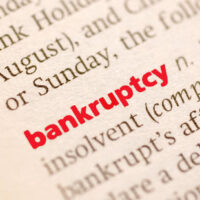Florida Clarifies Rights of Mortgage Holders in Bankruptcy

Although filing for Chapter 7 bankruptcy can eliminate most of your unsecured debts, it does not get you off the hook for any debts secured by property, such as your home mortgage. While filing for bankruptcy can delay a foreclosure, it cannot ultimately prevent the bank from taking your house if you are unable to make your mortgage payments. And thanks to a recent change in Florida law, you cannot “surrender” the house to the bankruptcy court while simultaneously fighting to keep the property in a state foreclosure proceeding.
Bankruptcy Filings May Be Used as Evidence in Foreclosure Proceedings
Back in 2016 we discussed a case where a debtor couple unsuccessfully tried to exploit this purported “loophole.” The debtors owned a house in Boca Raton with an underwater mortgage–i.e., they owed more on the property than it was worth. The debtors “surrendered” the property to the Chapter 7 bankruptcy trustee. But since the mortgage was underwater, the trustee “abandoned” the property back to the debtors. At the same time, the debtors opposed foreclosure of the property in Florida state court.
A federal appeals court held the debtors had no choice but to surrender the house to the mortgage lender. By filing for bankruptcy, they surrendered any right to keep the house. So even if the bankruptcy trustee abandoned his claim, the creditor’s secured claim remains intact.
Citing this case, the Florida legislature recently approved Senate Bill 220, which Gov. Rick Scott signed into law on March 21, 2018. This bill creates Florida Statutes Section 702.12, which expressly states a mortgage lender may use a borrower’s bankruptcy filings as evidence in a state foreclosure case. If, like in the case above, a borrower files a bankruptcy petition–a document signed under penalty under perjury–declaring their intent to surrender the mortgaged property, that creates a “rebuttable presumption” that said borrower “has waived any defense” to a foreclosure proceeding. This rebuttable presumption will not apply, however, if the borrower withdraws their bankruptcy filing prior to receiving a final discharge.
Note this law does not affect a homeowner’s rights in a Chapter 13 bankruptcy filing. Unlike Chapter 7, in a Chapter 13 case the debtor has the right to make up past-due mortgage payments during the term of the court-approved repayment plan, which can last up to five years. Of course, the debtor must remain current on any mortgage payments incurred after the filing of the Chapter 13 petition in order to avoid foreclosure.
Are You Looking to Protect Your Home in Bankruptcy?
In practice, SB 220 does not significantly alter the law so much as confirm what the courts have already held in prior bankruptcy cases. The upshot is that if you file for Chapter 7 bankruptcy, you are at risk of losing your home. Bankruptcy only eliminates your personal obligation to pay the mortgage, not the lender’s right to foreclose under Florida law. So if you are considering bankruptcy but want to try and keep your home, a Chapter 13 filing may be the way go. If you need advice from a qualified Miami bankruptcy lawyer on how to deal with your mortgage situation, contact the Law Office of Julia Kefalinos at (305) 676-9545 today.
Source:
flsenate.gov/Session/Bill/2018/220/BillText/er/PDF

